Think about the last meaningful talk you had or the laughter you shared. Those moments often start with a smile. A smile shows trust and friendship. Good oral health is key to a great smile. It’s not just about looking good. A radiant smile shows you are healthy. Making small, daily changes in oral care can lead to big wins. In this guide, we’ll share top tips for keeping your teeth and gums healthy. This will help boost your confidence every time you smile.
Key Takeaways
- Brush your teeth for two minutes, twice a day to maintain optimal oral health.
- Incorporate interdental cleaning into your routine for a fresher mouth.
- Fluoride is essential in toothpaste to strengthen tooth enamel and prevent decay.
- Limit frequent snacking and focus on three balanced meals daily.
- Regular dental check-ups are crucial; aim for every six months.
- Healthy snacks like crunchy fruits and vegetables can naturally cleanse your teeth.
Introduction to Oral Health
Oral health is more than just having white teeth. It plays a big role in your overall health. Studies show that over 40% of adults felt mouth pain in the last year. This shows us how common this problem is. Mouth pain can come from not taking care of your teeth well. Knowing how to keep your mouth healthy is key for everyone.
A lot of people, more than 80%, will get a cavity by the time they are 34. Doing the right things for your teeth can help avoid this. People with conditions like diabetes or heart disease are more at risk for tooth problems. As we get older, these problems can get worse because we produce less saliva and our gums shrink back.
For better oral health, drink water with fluoride and use fluoride toothpaste. Also, seeing a dentist once a year is important. Pregnant women need to take extra care of their teeth, especially if they have tooth pain or sensitivity.
Knowing about dental care also means knowing how to prevent issues. Doing this can save time and money. It also means less need for emergency dental visits. Overall, knowing how to take care of your teeth can make you feel better about yourself. It helps you and those you care about stay healthy.
The Importance of a Healthy Smile
A healthy smile is more than looking good; it’s key for your well-being. Good oral hygiene offers many benefits, not just for looks. It boosts confidence and helps with speaking and eating.
Benefits of Good Oral Hygiene
Good oral care keeps your smile bright and prevents problems like cavities and gum disease. Here are some main benefits:
- It lowers the risk of tooth decay and gum issues.
- Strong teeth can help you live longer.
- A great smile boosts your confidence.
- It stops plaque and tartar, preventing other mouth diseases.
| Oral Health Habit | Benefits |
|---|---|
| Brushing Twice Daily | It cuts down on plaque and reduces gum disease risk. |
| Flossing Regularly | Gets to spots brushing can miss, stopping cavities. |
| Regular Dental Checkups | Finds and fixes mouth problems early. |
Impact on Overall Health
Good oral hygiene is crucial for your overall health. Studies show a strong link between mouth health and other conditions. For example, having 20 or more teeth at 70 means you might live longer. Gum disease can also raise the cancer risk by 14% in older women. And healthy gums could make Alzheimer’s 70% less likely, showing how oral health affects much more.
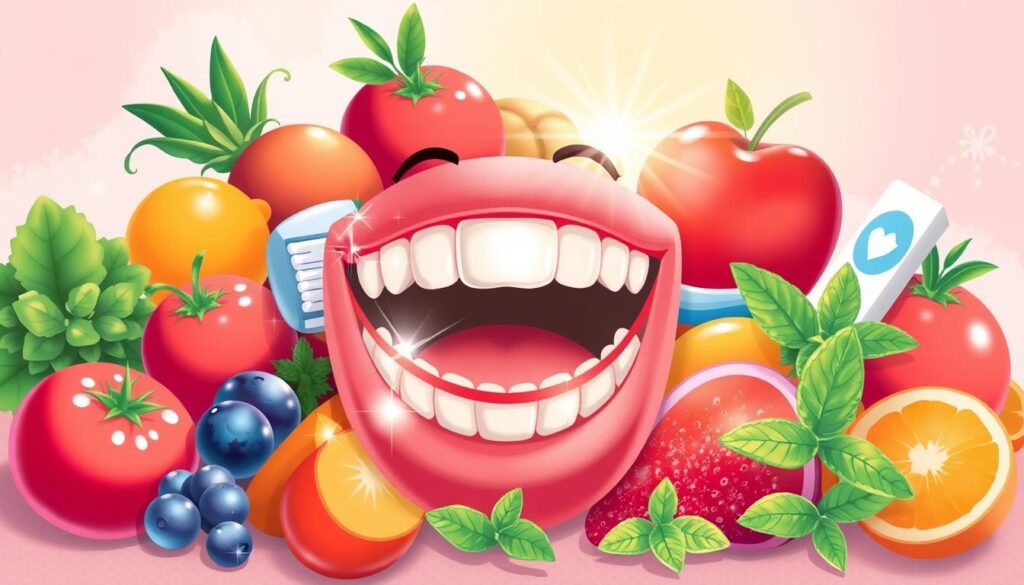
For pregnant women, healthy gums can mean a lower chance of having the baby early. Bad oral hygiene can lead to big health problems, making full dental care essential. Taking care of your smile not only helps now but ensures a healthier future.
Daily Brushing Techniques
Good oral health starts with the right brushing habits every day. Using the correct approach can help stop cavities and keep your gums healthy. Brushing twice daily for two minutes each is important. It ensures your teeth are well-cleaned and healthy.
Best Practices for Brushing Your Teeth
It’s important to brush the right way. The Bass method means angling your brush at 45 degrees to your gums. It helps clean better. When brushing, you should:
- Use gentle, circular strokes on all parts of your teeth.
- Go over each tooth surface 6-7 times for the best plaque removal.
- Try short side-to-side strokes as another good option.
A soft-bristled brush is best for protecting your gums while cleaning well. You should get a new brush every three to four months. If the bristles fray, replace it even sooner.
Choosing the Right Toothbrush and Toothpaste
Picking the right toothbrush and toothpaste is key for good mouth care. Choose products with the ADA Seal of Acceptance. They’re safe and work well. Here’s what to look for in brushes and toothpaste:
| Age Group | Toothbrush Type | Toothpaste Quantity |
|---|---|---|
| Children under 3 years | Soft-bristled, small head | Smear the size of a grain of rice |
| Children 3 years and older | Soft-bristled, right for their age | Pea-sized amount |
| Adults | Soft-bristled or electric | Pea-sized amount |
Using fluoride toothpaste is important. It strengthens your enamel and cuts down on decay. Following these tips will make your dental health much better over time.
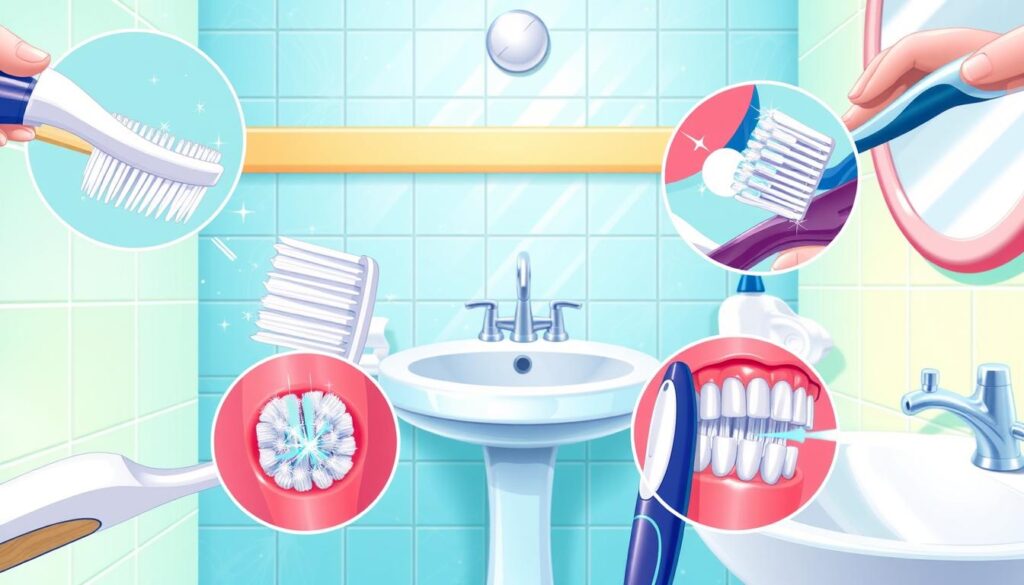
Best Oral Health Tips: Interdental Cleaning
Interdental cleaning is key for good oral hygiene. Brushing misses tight spaces between teeth where plaque and food hide. Adding interdental cleaning to your daily habits cuts down gum disease and cavity risks.
Why Flossing is Essential
Flossing is vital for mouth health. It tackles debris that brushing can’t. Floss daily to fight gum disease seen in adults over 30. It helps keep gums healthy by reducing plaque and inflammation.
Using Interdental Brushes Effectively
Besides floss, interdental brushes are great for cleaning. They fit between teeth, removing plaque better. Studies show they’re more effective than floss. Use them gently between your teeth for best results.
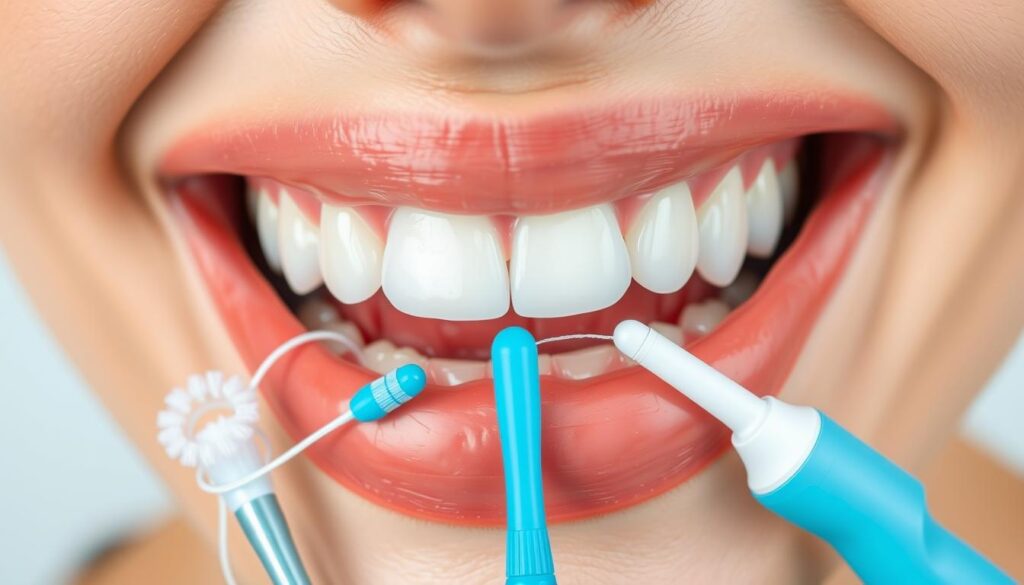
- Use interdental brushes regularly to enhance your oral hygiene routine.
- Floss at least once a day to maximize benefits.
- Rinse your mouth after interdental cleaning to wash away loosened debris.
| Cleaning Tool | Effectiveness | Ease of Use |
|---|---|---|
| Dental Floss | Moderate | Moderate |
| Interdental Brushes | High | Easy |
| Water Flosser | High | Very Easy |
Fluoride and Your Oral Health
Fluoride is key in protecting your teeth from decay. It’s a natural mineral that boosts tooth enamel, fighting off harmful acids. These acids form when you eat or drink and attack your teeth. Knowing how fluoride works helps you take better care of your teeth.
The Role of Fluoride in Preventing Decay
Eating foods can cause your teeth to lose minerals, making them weak. Fluoride steps in to fix this by replacing lost minerals, strengthening your enamel. Plus, adding fluoride to water lowers cavity rates by 20-40%. This makes it a powerful tool in your dental care lineup.
Using fluoride toothpaste is another smart move, cutting down cavity risk by about 25%. It’s among the best ways to fight tooth decay.
Benefits of Using Fluoride Mouthwash
Adding fluoride mouthwash to your routine gives your teeth extra protection. It’s especially good for those who easily get cavities, cutting their risk by 50%. This mouthwash cleans away small food pieces and boosts fluoride’s benefits. If cavities are a concern, consider using a fluoride mouthwash daily or weekly.
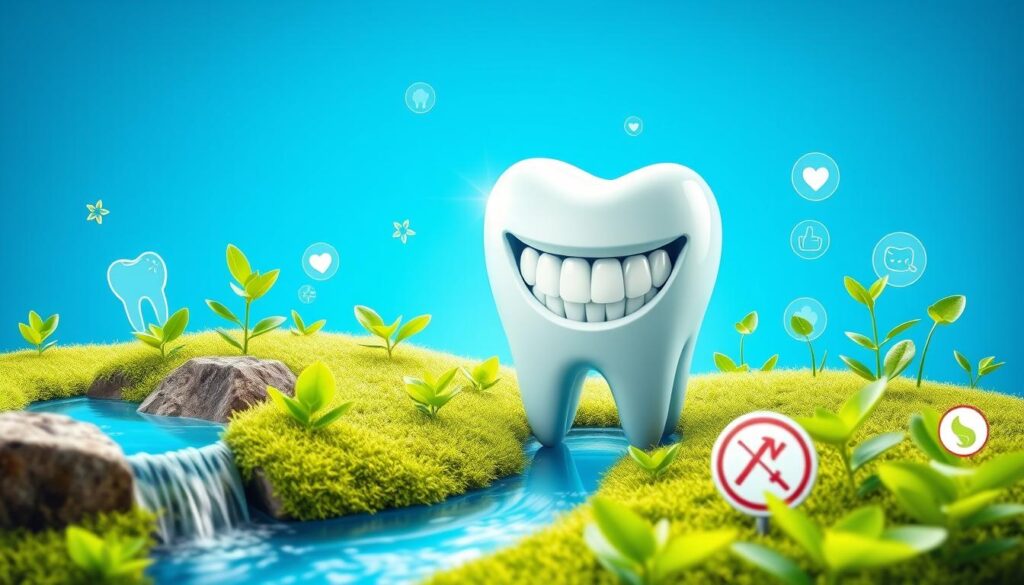
| Fluoride Product | Usage Rate | Cavity Prevention Rate |
|---|---|---|
| Fluoride Toothpaste | 85% of American households | Approximately 25% reduction in cavities |
| Fluoride Mouthwash | Daily or weekly for high-risk patients | Estimated 50% reduction in cavities |
| Fluoride Varnish | Every 3 to 6 months | Effective protection against cavities |
Diet and Its Impact on Dental Health
Your diet dental health plays a big role in keeping your teeth and gums healthy. To take good care of your mouth, you should choose your food carefully. Try to eat many different foods that are good for your teeth and your health.
Foods to Promote Healthy Teeth
Eating healthy foods is key for good oral health. Here are some good choices:
- Dairy Products: Milk, cheese, and yogurt have calcium and phosphates. They make tooth enamel stronger.
- Fruits and Vegetables: Eating crunchy fruits like apples and veggies like carrots helps clean your teeth. They also make you produce more saliva.
- Whole Grains: Brown rice and whole grain breads are full of nutrients. They are better than foods with a lot of sugar.
- Nuts: Peanuts and almonds are great because they have protein. They can also balance the acid in your mouth, which helps protect your teeth.
Eating these foods often is great for your diet dental health. It helps keep your smile looking good.
How Sugar Affects Your Oral Health
The sugar impact on your oral health is huge. Eating too much sugar can cause cavities and gum disease. Some common sugary foods are:
- Soft drinks
- Candies and cookies
- Flavored yogurts and milk
- Breakfast cereals
- Pastries and juices
Having sugar too often lowers your mouth’s pH level. This feeds the bad bacteria leading to tooth decay. To protect your teeth, eat less sugar and choose balanced meals. Foods eaten during meals are usually less harmful. This is because you make more saliva then, which helps fight acids.
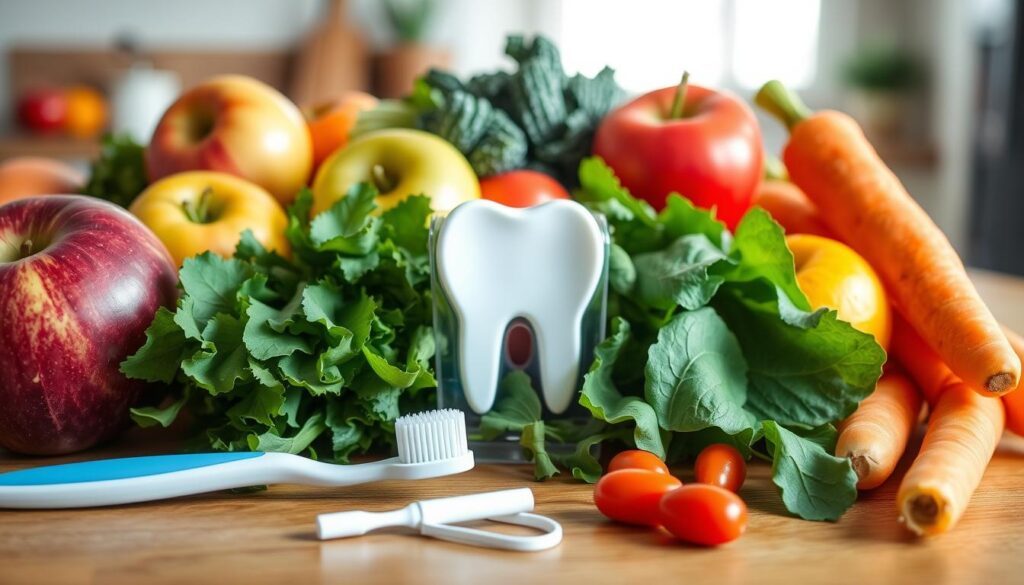
Avoiding Harmful Habits
Taking care of your teeth involves more than just brushing and flossing. You need to avoid certain habits that can harm your teeth and gums. This includes being aware of how smoking and drinking alcohol can impact your oral health. Making wise choices can keep your smile healthy.
The Dangers of Smoking and Tobacco Use
Smoking is really bad for your mouth. If you smoke, you’re more likely to get gum disease. Actually, smokers are four times more at risk than people who don’t smoke. Smoking also causes lots of plaque to build up on your teeth. This can lead to gum disease and really bad stains.
After just a few weeks of smoking, your teeth may start to turn yellow. Keep smoking, and the stains can get so bad they permanently change your smile’s look. If you don’t stop, you might even lose some teeth because of these bad habits.
The Impact of Excessive Alcohol Consumption
Drinking too much alcohol is also harmful to your teeth. People who drink a lot have more plaque, which can cause tooth decay and even tooth loss. Alcohol dries out your mouth too. This is bad because saliva helps clean your mouth.
If your mouth is always dry, you could get gum disease. So, it’s really important to not smoke and to drink alcohol in moderation. This will help keep your mouth healthy and your smile looking good.

Maintaining Fresh Breath
Having fresh breath boosts confidence and social interactions. Yet, 25% to 30% of people struggle with bad breath. Knowing what causes bad breath is the first step to fix the problem and find relief.
Common Causes of Bad Breath
Several things can cause bad breath. Let’s look at some common reasons:
- Poor oral hygiene, which promotes bacterial growth
- Gum disease and tooth decay
- Dry mouth, often from not drinking enough water or certain medicines
- Consumption of pungent foods, like garlic and onions
- Smoking, which directly affects breath quality
- Fasting or skipped meals, leading to stomach acid build-up
Effective Remedies to Combat Bad Breath
To fight bad breath, you need good oral care and some changes in habits:
- Brush your teeth twice a day for two to three minutes with fluoride toothpaste to fight bacteria.
- Floss daily to get rid of plaque and food stuck between teeth.
- Drink six to eight 8-ounce glasses of water daily to keep your mouth from drying out.
- Rinse with green or black tea, which helps control bacteria.
- Chew sugarless gum to make more saliva and freshen your breath.
- Add crunchy fruits and vegetables like apples and celery to your diet for more saliva flow.
- Consider an antibacterial mouthwash to kill bad odor germs.

| Practice | Impact on Breath |
|---|---|
| Brushing Twice Daily | Reduces bacteria by up to 50% |
| Flossing | Removes 30% of plaque |
| Hydration | Decreases dry mouth risks |
| Chewing Sugarless Gum | Boosts saliva production by 10 times |
Knowing what to do, and doing it consistently, makes fresh breath easy to maintain every day.
When to Seek Professional Dental Care
Knowing when to visit the dentist is key to keeping a healthy mouth. Dentists play a big role in spotting problems early. They say going to the dentist twice a year keeps your mouth in top shape.
Importance of Regular Dental Checkups
At regular visits, your dentist checks your mouth, cleans your teeth, and does needed treatments. These visits matter more as people get older. This is especially true for those over 65, who face more dental risks.
Getting your teeth professionally cleaned can stop plaque buildup. Plaque is a clear layer of germs that can cause cavities and gum disease if not treated. The American Dental Association states these checkups are crucial at every age. This includes kids, who should have their first dentist visit by their first birthday.
Signs You Should See a Dentist
Knowing the signs that it’s time for a dental visit is crucial. Key signs include:
- Persistent tooth pain affecting your daily life
- Gums that are swollen or bleed, which may be a sign of gingivitis
- Having trouble biting or chewing
- Teeth that are very sensitive to hot or cold
- Seeing cavities or dark spots on your teeth
Dealing with these issues quickly can stop bigger problems like bad toothaches or infections. Good dental health comes from regular dentist visits and taking care of your teeth every day.

Best Oral Health Practices for Kids and Adults
Starting good oral health habits early is key. Kids learn best when oral care is fun. Adults will also benefit from a set routine for lasting dental health.
Educating Children About Proper Oral Care
For kids, learning about teeth should be fun. Start by showing them brushing and flossing is cool. Use colorful tools to keep them brushing for two minutes.
Here are a few ways to teach them:
- Organizing family dental health days.
- Utilizing charts to track brushing progress.
- Reading books or watching videos about oral hygiene.
Use fluoride treatments to stop cavities. Taking kids to the dentist by age one is also smart.
Building a Routine for Lifelong Dental Health
Everyone benefits from a daily dental care routine. For adults, it’s all about keeping good habits.
- Brushing twice a day with fluoride toothpaste.
- Flossing daily to eliminate plaque between teeth.
- Scheduling regular dental checkups at least twice a year.
Watch over your kids as they learn to brush well. Eat well and avoid too much sugar. Start good habits now for healthy teeth in the future.

Conclusion
Good oral health is more than just for a nice smile. It also greatly impacts your overall health. By following tips like proper brushing, cleaning between your teeth, and eating better, you’re on your way to a better smile. Seeing your dentist regularly helps catch issues early and keeps your teeth and gums healthy.
This summary reminds us that taking care of our oral health has lasting benefits. With around 75% of Americans having gum disease, it’s obvious care is needed. By looking after your oral health, you not only enhance your smile but also lower your risk of serious health problems. Start focusing on your dental care today, and you’ll be grateful tomorrow.
Adopting these practices means fresher breath, fewer cavities, and a more beautiful smile. This boosts your confidence enormously. Your oral health is crucial for both your looks and your general well-being. Take steps now for a healthier and more glowing smile.










